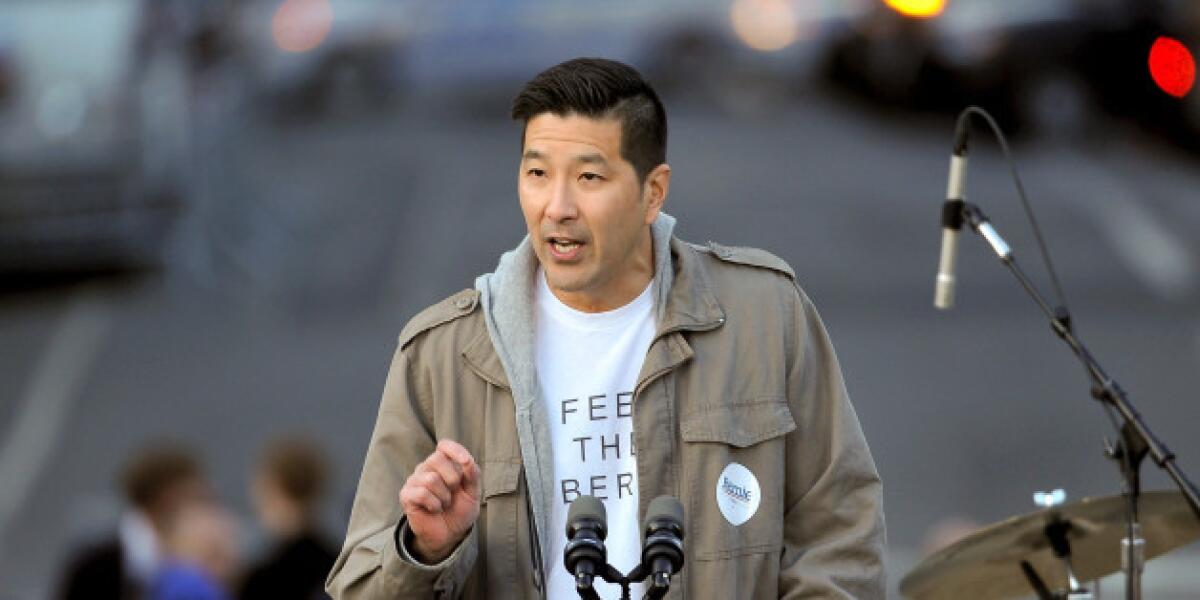Is single-payer healthcare dead in the U.S., or only sleeping?
- Share via
The dream of bringing single-payer healthcare to the United States is a hardy one. It's still with us despite years of disrespect by the general public, intense opposition from powerful stakeholders in the healthcare economic status quo, and the enactment of the very non-single payer system known as Obamacare.
Should we give up on the dream, already? That's the question raised by a provocative recent article in the New England Journal of Medicine by Jonathan Oberlander, a political scientist and health policy expert at the University of North Carolina, one of the most percipient critics of the U.S. healthcare system.
The enduring appeal of Medicare for All is understandable, given the fragmented, inequitable, costly, profit-driven, and wasteful nonsystem that prevails in the United States.
—Healthcare expert Jonathan Oberlander
His regretful answer is yes.
"Single-payer," he writes "has no realistic path to enactment in the foreseeable future. It remains an aspiration more than a viable reform program." Instead, he argues that "preserving and strengthening the ACA, as well as Medicare, and addressing underinsurance and affordability of private coverage" is "the best way forward now for U.S. medical care."

Oberlander's words may trigger an uproar among single-payer advocates, and not merely because they're passionate about their goal and convinced that it's the only sure way of bringing universal coverage to the U.S., but because they're probably right.
Anyone seeking a clue to how passionate they are need only examine the controversy ignited recently by one of our most dedicated single-payer advocates, the Los Angeles oncologist and biotech executive Paul Y. Song.
Speaking at a New York rally for Bernie Sanders, the single-payer advocate running for the Democratic nomination for President, Song laced into the opponents of single-payer: "Medicare for all will never happen if we continue to elect corporate Democratic whores who are beholden to big pharma and the private insurance industry instead of us," he said. The twitterverse decided he must have been calling Hillary Clinton a "whore," Sanders disavowed the statement, and Song issued a heartfelt apology.
Song is someone I know well and respect as a serious student of healthcare policy and a valiant crusader for single-payer healthcare (we've shared panel appearances on this and other healthcare topics). He was unfairly pilloried for his terminology; having been present at many single-payer debates, I find it perfectly plausible that Song was referring generally to Democrats of little faith. (His wife, the journalist Lisa Ling, is a Clinton supporter.)

What's worse, his basic point got obscured once the social media outrage machine went into overdrive. It's a sound one and hardly subject to dispute: the obstacles to single-payer include "big pharma and the private insurance industry," along with political leaders who allow those industries' interests to control the policy discussion. It's a safe guess that Hillary Clinton, still bearing scars from her experience trying to get healthcare reform enacted during her husband's Administration, wouldn't disagree.
Oberlander, for his part, is impressed that single-payer is at least back on the debate floor, thanks in part to Sanders, whose platform includes Medicare-for-all. I've analyzed the Sanders proposal critically, while acknowledging that single-payer deserves to be front-and-center in any discussion of U.S. healthcare reform.
Many healthcare experts faulted Sanders for failing to accept that the American political system simply isn't going to get over its hostility to single-payer any time soon. Oberlander's point is that a fixation on single-payer threatens to become a distraction from efforts to preserve the gains already made and enact achievable advances in reform.
The irony is that Oberlander acknowledges that "the enduring appeal of Medicare for All is understandable, given the fragmented, inequitable, costly, profit-driven, and wasteful nonsystem that prevails in the United States." He notes, too, the failure (so far) of Obamacare to bring relief to the unaffordability of medical treatment for many Americans and the presence of a population of uninsureds that still numbers 30 million.
But aspiring to solve these problems via single-payer healthcare isn't enough, he argues. "Single-payer supporters have not articulated a convincing strategy for overcoming the formidable obstacles that stand in its way."
Medicare for All "would trigger fierce resistance from conservatives and the business community and anxiety in many insured Americans fearful about changing coverage and the specter of rationing" Oberlander writes. "The ACA’s comparatively conservative reform approach inspired false charges of 'socialized medicine,' 'pulling the plug on grandma,' and 'death panels.' It takes only a little imagination — or a look back at the history books — to predict the reactions that an actual single-payer plan would evoke."
He might have added that enactment of Medicare for all would intensify, rather than quell, the politicization of healthcare in the U.S. To quote again healthcare policy expert Harold Pollack, as we did in our analysis of the Sanders proposal: "Imagine the national policy debate over abortion, contraception, HIV prevention, immigration policy, and other matters in a national Medicare plan."
No rational expert on healthcare doubts that some form of single-payer is the best device for true healthcare reform in the U.S.--although as Oberlander notes, there are almost as many forms of single-payer in existence as there are countries that claim to apply it, from Britain's government-owned healthcare system to Canada's privately-owned but government-insured system, to the hybrid versions in Germany and Switzerland.
Oberlander believes that some incremental steps toward single-payer are "conceivable" but that a viable full-scale transformation is simply not currently foreseeable. He's not so far apart from some of single-payers' most dedicated advocates, many of whom take the long view.
The possible paths are many, but the goal beckons from the very distant future. What drives the single-payer dream is an essential truth, articulated for me a few years ago by the late Arnold Relman, the reformist former editor of the New England Journal of Medicine: "It's the only logical solution."
Keep up to date with Michael Hiltzik. Follow @hiltzikm on Twitter, see his Facebook page, or email michael.hiltzik@latimes.com.
Inside the business of entertainment
The Wide Shot brings you news, analysis and insights on everything from streaming wars to production — and what it all means for the future.
You may occasionally receive promotional content from the Los Angeles Times.








